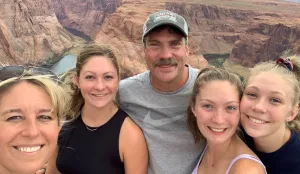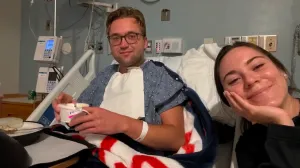
Heather Strong, a nurse, lifelong athlete and 48-year-old mom of 3 adult daughters, is very in tune with her body. She’s hiked all 48 of New Hampshire’s 4,000 footers (some of them several times), golfs regularly and has even run up Mount Washington. So in November 2023, when the right side of her body went numb and her leg gave out, she knew something was wrong. She asked her daughter to drive her to the New Hampshire hospital where she’s worked for nearly three decades.
“By the time I walked into the emergency room, my symptoms had resolved,” Heather recalled. “My EKG and CT scans came back normal. But I’m the healthiest person I know and I’m not one to overreact, so I knew I needed to be persistent.”
That decision likely saved her life. After pushing for further testing, an MRI revealed that Heather had suffered a stroke. The information put other episodes of numbness she’d experienced over the years into context. She realized she’d had several transient ischemic attacks (TIAs), often called "mini-strokes," which occur when there is a temporary blockage of blood flow to the brain, causing stroke-like symptoms.
Initial testing suggested the cause might be a relatively common condition called patent foramen ovale (PFO), a small hole in the heart that’s present at birth but may not close naturally. Still, the underlying cause remained a mystery—until months later, when she was referred to Tufts Medical Center. At the Medical Center, David Thaler, MD, PhD, Neurologist-in-Chief and Carey Kimmelstiel, MD, Director of Interventional Cardiology, reviewed her history, including prior episodes of vision loss and unexplained numbness.
Further testing revealed Heather’s heart defect was not a PFO but a congenital condition called atrial septal defect (ASD), a hole between the heart’s chambers. Dr. Kimmelstiel recommended a minimally invasive closure using the Abbott Amplatzer device—a game-changing alternative to open-heart surgery. The timeline for the procedure was accelerated when Heather experienced yet another minor stroke and in April 2024, Dr. Kimmelstiel and his team successfully closed the ASD. Driven as always, Heather was almost immediately ready to get back to work and already planning her next hiking adventure.
But Heather’s story didn’t end there. Knowing some heart conditions can run in families, she encouraged all three of her daughters to get screened. Two of them, Emma, a fellow nurse, and Molly, another lifelong athlete, were diagnosed with the same defect—an exceedingly rare occurrence.
“I just felt this strong instinct as a mom,” Heather said. “Even though they were healthy and had no symptoms, I knew it was better to check and be safe.”
In December, Dr. Kimmelstiel performed the same outpatient procedure on Molly and Emma, with Heather by their side. “We leaned on each other,” said Heather. “I knew they were in the best hands. The whole Tufts Medical Center team was incredible. I felt how much they cared for all of us and I never felt alone in the process.”
Heather’s advice to others who might find themselves with unexplained symptoms? “Even the healthiest people can have underlying conditions—listen to your body and push for answers for you and your family.”


